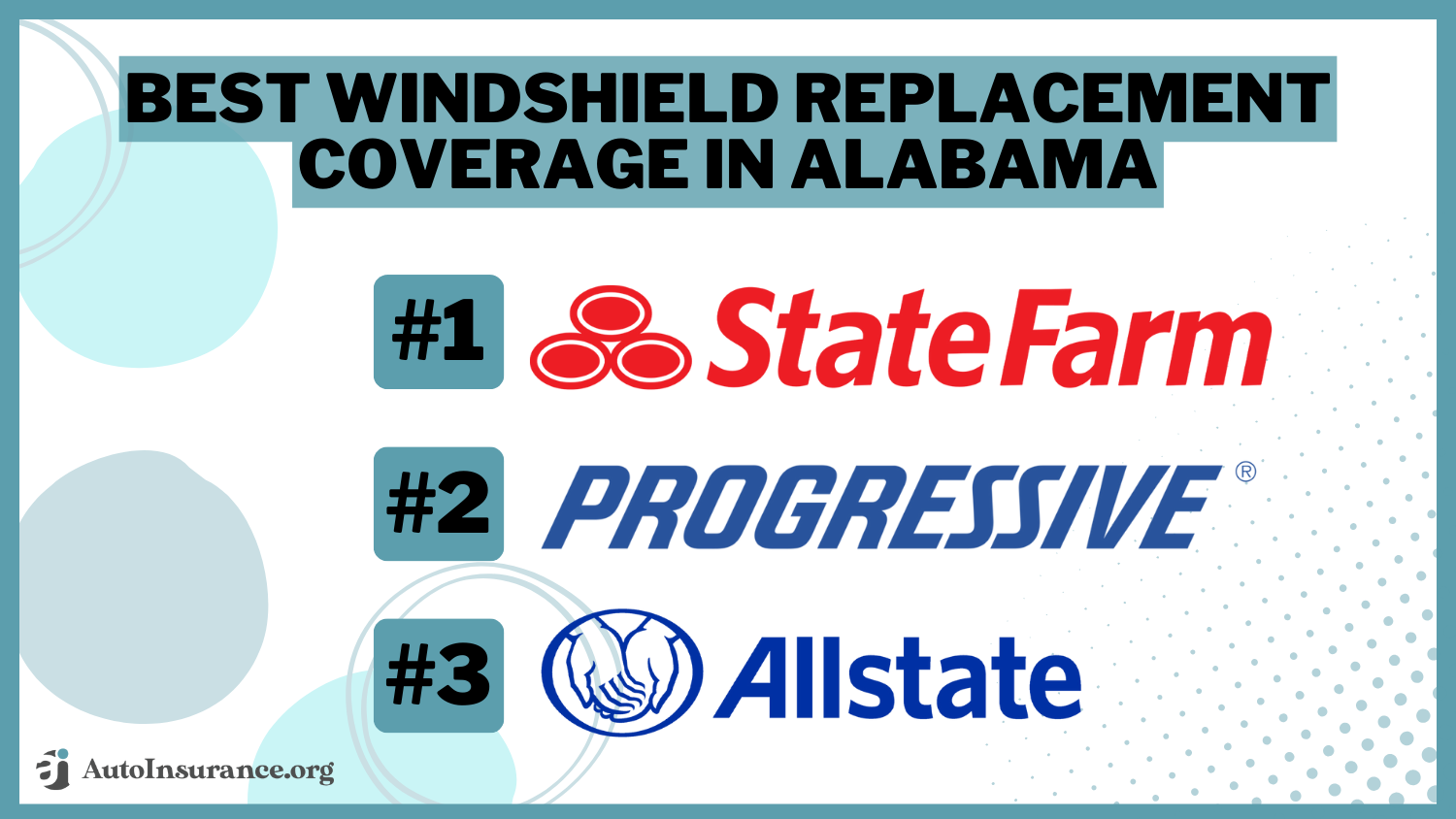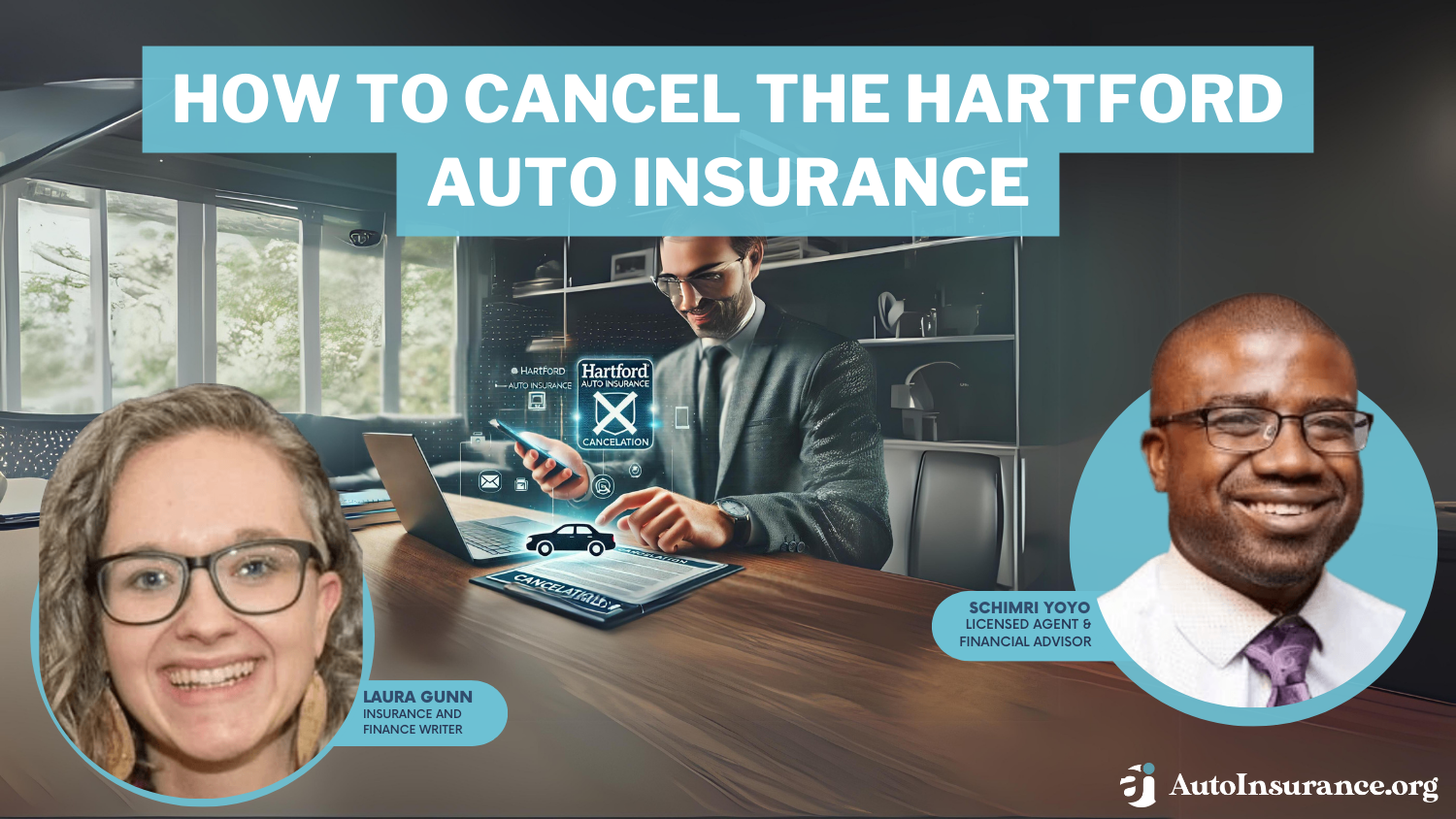Does car insurance cover hurricane damage?
Comprehensive insurance covers damage from hurricanes and tropical storms, but you need to have it before a storm lands. This coverage is usually affordable, averaging only $13 a month.
Read more Secured with SHA-256 Encryption




Table of Contents
Table of Contents

Feature Writer
Aremu Adams Adebisi graduated from college with a B.Sc in Economics. He's currently pursuing his MBA while writing insurance features covering trending topics in the car insurance industry. He's fascinated by the surges of insurtech in an era of decentralized finance (DeFi). Aremu has written for several insurance agencies and companies. He profiles startups on Insideropedia and serves as a con...
Aremu Adams Adebisi


Licensed Insurance Agent
Kristen is a licensed insurance agent working in the greater Boston area. She has over 20 years of experience counseling individuals and businesses on which insurance policies best fit their needs and budgets. She knows everyone has their own unique needs and circumstances, and she is passionate about counseling others on which policy is right for them. Licensed in Massachusetts, New Hampshire,...
Kristen Gryglik
Updated December 2024
Hurricanes and tropical storms wreak havoc in communities, causing billions of dollars in damage and forever impacting some areas. People who live in areas frequently affected by hurricanes and their remnants need the right type of insurance if they want their cars protected.
Although there is no such thing as hurricane car insurance, you can protect your vehicle by getting comprehensive and collision insurance. Unlike liability auto insurance — which only covers damage you cause — comprehensive and collision handle floods, flying debris, accidents after hazardous conditions, wind, and storm surges.
Read on to learn more about hurricane insurance, how much it costs, and if you need it. Then, compare quotes with as many companies as possible to find your most affordable option.
- Comprehensive insurance covers damage caused by hurricanes and tropical storms, including flooding, extreme winds, and flying debris
- Most companies don’t sell new insurance right before a hurricane makes landfall
- Comprehensive insurance is usually an affordable addition, but some companies require you to buy collision coverage at the same time
Does car insurance cover hurricane damage?
Hurricanes can cause extensive damage to your car and can easily cause your vehicle to be totaled. You need comprehensive coverage if you want your car insurance to cover potential hurricane damage.
Comprehensive insurance is a type of coverage that covers damage from unexpected events outside of car accidents. While every company is different, comprehensive auto insurance typically covers the following:
- Extreme weather and natural disasters
- Fire
- Flooding
- Animal damage, including hitting an animal while driving
- Theft
- Vandalism
- Civil disturbances
- Falling objects
- Explosions
Tropical storms and hurricanes can damage vehicles in a variety of ways. High winds, flooding from heavy rain, storm surges, and flying debris are some of the most common ways cars are damaged during an intense storm.
Hurricanes and tropical storms are gaining intensity and making landfall more frequently, so cars are at a higher risk than ever before. Unfortunately, comprehensive insurance is the only type of coverage that will pay for repairs if the storm damages your vehicle.
Hurricanes also create hazardous driving conditions. If you have an accident with another driver or hit a stationary object, you’ll need to understand what collision insurance is to cover your car properly.
As you’ll see below, most insurance companies do not let drivers add comprehensive and collision insurance to their policies within a certain period before a hurricane makes landfall. If you live in an area prone to tropical storms, you should consider buying comprehensive and collision insurance before hurricane season starts.
Does insurance cover tornado damage?
Hurricanes can spawn tornadoes. Similar to hurricanes, comprehensive insurance covers your car during tornadoes. That includes the most common damage from tornadoes, including wind, hail, floods, lighting, and flying debris. You’ll have to pay your deductible, but insurance will cover your car.
Comprehensive also covers damaged windshields, windows, and headlight covers. Depending on your state, you might not have to pay your deductible if your glass can be repaired. It also covers structural damage to your car if a heavy object falls or collapses on top of it.
Free Insurance Comparison
Compare Quotes From Top Companies and Save
Secured with SHA-256 Encryption
What is a hurricane moratorium?
A hurricane moratorium is an announcement insurance companies make to say they are pausing the sale of new policies or additional coverage. Usually, a hurricane moratorium means you cannot make changes to your plan until it’s lifted.
Insurance companies do this to prevent people from buying coverage right before a storm, making a claim, and dropping it after. Allowing customers to do this would be financially devastating for companies and significantly drive up other customers’ rates.
When should you buy auto insurance?
Most insurance companies restrict when you can buy coverage to prevent a surge of drivers buying temporary comprehensive insurance right before a hurricane. Each company has its own time frame, but they are usually based on forecasts from the National Hurricane Center.
Hurricane warnings are typically issued when a storm will make landfall within 36 hours, with a storm watch being issued within 48 hours if high winds are expected. Once a storm warning is out, most insurance companies temporarily deny any applications for comprehensive insurance in areas predicted to be hit.
The amount of restriction on changing your insurance depends on the company. Some companies shut down all new policies and modifications, meaning you’ll have to wait to buy more coverage until the storm is over.
Others allow drivers to increase or decrease their policy limits but don’t allow the purchase of new coverage.
Generally speaking, it’s always best to buy insurance before you need it. However, if you know you live in an area at risk of hurricane or tornado damage, you should consider keeping comprehensive and collision insurance year-round.
How do you file a hurricane car insurance claim?
Filing a comprehensive claim after a hurricane works the same as filing a car insurance claim with any other type of insurance. To start, you’ll need the following information:
- Your policy number
- Your license plate number
- Photos of the damage the hurricane did to your car
It’s important to start the claims process as soon as possible after a hurricane, especially if there’s flood damage to your car. For one, salt water in your vehicle can cause more damage the longer it stays in your engine.
Additionally, many claims will be made after a hurricane, and insurance companies will struggle to keep up. Therefore, the faster you get your claim started, the quicker your claim will be looked at.
Your insurance company will send a claims adjustor to evaluate the scope of damage to your car and determine if it should be totaled. The adjustor or a repair shop might do this evaluation in person. Once the adjustor completes their evaluation, your company will send you a payment minus your deductible.
Do you have to pay a deductible after a hurricane?
A car insurance deductible is a portion you must pay before your insurance kicks in. Every company is different, but most let you choose a deductible between $500 and $2,000. Comprehensive and collision insurances both have deductibles, so you’ll be responsible for at least a small portion of the repair bill.
To understand deductibles, say a hurricane makes landfall in your area and does $4,000 worth of damage to your car. If you have a $1,000 deductible, your insurance company will cover $3,000 of the total repair bill.
It’s important to evaluate how much your repair bill will be compared to your deductible. In the above example, filing a claim wouldn’t be worth it if the hurricane had only done $800 in damage to your car.
Free Insurance Comparison
Compare Quotes From Top Companies and Save
Secured with SHA-256 Encryption
How much does hurricane insurance cost?
The average cost of hurricane insurance depends on the state you live in. To get an idea of how much hurricane insurance costs, check out the average rates for comprehensive and collision in your state below.
Collision and Comprehensive Auto Insurance Monthly Rates by State
| State | Collision | Comprehensive |
|---|---|---|
| Alabama | $32 | $15 |
| Alaska | $32 | $12 |
| Arizona | $27 | $17 |
| Arkansas | $31 | $20 |
| California | $40 | $8 |
| Colorado | $28 | $23 |
| Connecticut | $34 | $11 |
| Delaware | $29 | $12 |
| Florida | $30 | $12 |
| Georgia | $34 | $15 |
| Hawaii | $30 | $9 |
| Idaho | $22 | $12 |
| Illinois | $28 | $12 |
| Indiana | $24 | $11 |
| Iowa | $21 | $18 |
| Kansas | $24 | $23 |
| Kentucky | $26 | $14 |
| Louisiana | $41 | $21 |
| Maine | $25 | $9 |
| Maryland | $35 | $14 |
| Massachusetts | $37 | $12 |
| Michigan | $40 | $13 |
| Minnesota | $22 | $17 |
| Mississippi | $31 | $20 |
| Missouri | $26 | $18 |
| Montana | $24 | $26 |
| Nebraska | $23 | $22 |
| Nevada | $31 | $10 |
| New Hampshire | $27 | $10 |
| New Jersey | $35 | $11 |
| New Mexico | $26 | $18 |
| New York | $38 | $15 |
| North Carolina | $29 | $11 |
| North Dakota | $23 | $21 |
| Ohio | $25 | $11 |
| Oklahoma | $29 | $22 |
| Oregon | $23 | $9 |
| Pennsylvania | $31 | $14 |
| Rhode Island | $40 | $12 |
| South Carolina | $27 | $17 |
| South Dakota | $20 | $27 |
| Tennessee | $30 | $14 |
| Texas | $37 | $22 |
| Utah | $26 | $11 |
| Vermont | $27 | $12 |
| Virginia | $26 | $12 |
| Washington | $26 | $10 |
| Washington D.C. | $45 | $19 |
| West Virginia | $29 | $19 |
| Wisconsin | $21 | $13 |
| Wyoming | $25 | $26 |
| U.S. Average | $31 | $14 |
As you can see, collision and comprehensive insurance rates are generally affordable. However, they’re often more expensive in coastal areas with a higher risk of hurricane damage. The extra cost is usually worth it since having it before a hurricane can save you thousands of dollars.
Which states have the most hurricanes?
According to the National Oceanic and Atmospheric Administration, Florida and Texas have received 88% of all hurricanes in recorded U.S. history. However, Florida is hit much more often with major hurricanes, the latest being Hurricane Ian in September of 2022. Because of this, Florida auto insurance and Texas auto insurance can come with higher rates.
Although Florida and Texas are the most commonly impacted states by hurricanes, several others are also frequently affected.
Remember that the remnants of a hurricane can cause widespread damage to vehicles even after the storm has been downgraded. For example, Hurricane Katrina caused devastation in Louisiana in 2005. After the storm was no longer strong enough to be classified as a hurricane, heavy rains continued north and caused flooding in New York.
What should you do if your car is flooded?
Unfortunately, flood damage is common after a hurricane. You’ll likely see some water damage from storm surges to heavy rain if you’re in the hurricane’s path.
Comprehensive insurance covers flooding, meaning your policy will pay for repairs if the damage isn’t too extensive. Floodwater can seriously damage your car, so your insurance might choose to replace the car instead.
If your car has flood damage, consider the following tips:
- Examine your car. If the flood water only reaches the floor of your vehicle, likely, the damage isn’t too bad, and you might be able to drive it. However, you should avoid turning on your car if the engine was submerged at some point, as it could cause more harm.
- Take photos. Having photographic evidence of the damage to your car will help make the claims process smoother.
- File a claim. As stated before, many people will probably file a claim for the same flooding. The faster you start your claim, the faster it will be resolved.
- Have a mechanic inspect your car. A mechanic can tell you how extensive the damage is to your vehicle and if it’s safe to drive. Depending on the level of flooding, you should have your car towed to your mechanic to avoid more damage.
Once you’ve completed these steps, you must wait for your insurance company to send you a payment. Some insurance companies will issue a check or direct deposit to your bank account, while others pay the mechanic working on your car directly.
Free Insurance Comparison
Compare Quotes From Top Companies and Save
Secured with SHA-256 Encryption
Final Thoughts: Car Insurance and Hurricane Damage
With storms predicted to get stronger and more frequent, having the right insurance to protect your car is more important than ever. People living in coastal areas and states that often feel the effects of hurricanes should consider adding comprehensive and collision to their policies year-round.
Adding more insurance to your policy will increase your rates, but the extra protection is worth it. If you’re interested in adding collision or comprehensive to your policy, make sure to compare quotes with as many companies as possible to find the best rates.
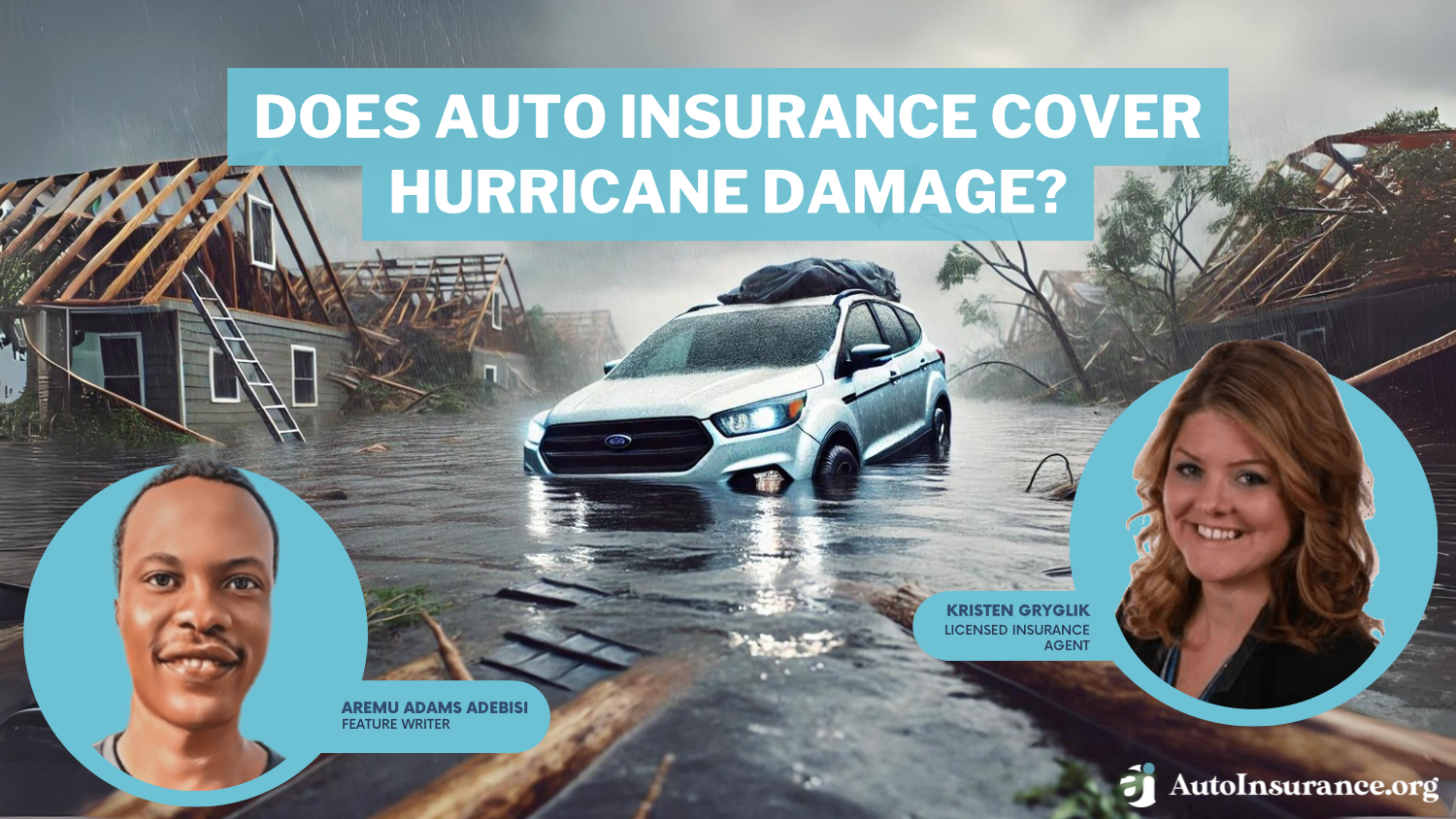
Frequently Asked Questions
Will your car insurance rates increase after a hurricane?
Your rates will likely increase if you need to make a claim after a hurricane. You might also see a general increase in insurance prices, even if you didn’t make a claim, as companies try to recoup some of their losses after a major storm.
Do you need hurricane insurance in Florida?
Florida does not require drivers to carry comprehensive and collision insurance, so you technically don’t need it. However, the extra protection in the state most often hit by hurricanes is probably worth the additional cost.
Can you get hurricane insurance right before a storm hits?
Most insurance companies suspend the sale of new insurance before a storm makes landfall to prevent people from buying temporary coverage. So to be covered during a storm, you’ll need to have a policy in place beforehand.
Do you need comprehensive and collision insurance?
No state requires comprehensive or collision insurance to drive legally, but you might need it if you have a car loan or lease. If you have a new or valuable car, getting both types of coverage is usually worth the investment.
Does car insurance cover hurricane damage?
Yes, car insurance can provide coverage for hurricane damage, but it depends on the specific policy and coverage options you have.
What type of car insurance coverage typically covers hurricane damage?
Comprehensive car insurance coverage typically covers hurricane damage. This coverage is optional and is usually added to a basic auto insurance policy.
Get a FREE Quote in Minutes
Insurance rates change constantly — we help you stay ahead by making it easy to compare top options and save.

